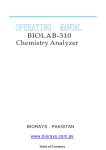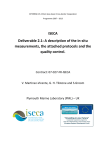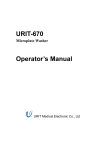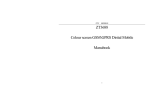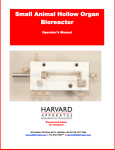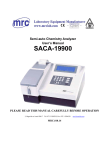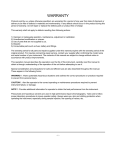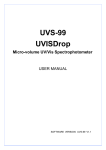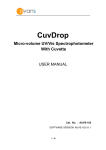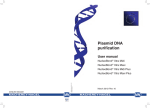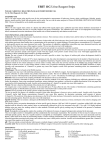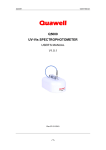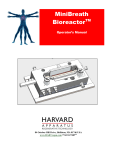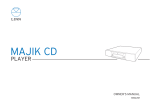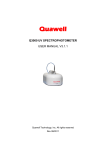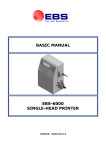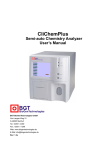Download user manual
Transcript
URIT-800 Chemistry Analyzer URIT Medical Electronic Co.,LTD Contents Copyright and declaration............................................................... 1 Preface ........................................................................................ 3 1 General Description .................................................................. 7 1.1 Specifications ......................................................................... 7 1.2 Principle and Component ......................................................... 8 1.3 Functions ............................................................................... 10 2 Installation ................................................................................ 11 2.1 Unpacking .............................................................................. 11 2.2 Instrument Installation ............................................................ 11 2.3 Software Installation and Registration ....................................... 12 2.4 Software Online ...................................................................... 13 2.5 Software Initialization ............................................................. 13 3 Operation .................................................................................. 14 3.1 Start-up .................................................................................. 14 3.2 Preparation ............................................................................ 14 3.3 Setup of Item Parameters ........................................................ 15 3.4 Setup of Item test .................................................................... 15 3.5 Registration of Result .............................................................. 15 3.6 Modification of Result .............................................................. 16 3.7 Recall of Sample ..................................................................... 16 3.8 Help ....................................................................................... 16 3.9 Logout ................................................................................... 16 3.10 Ending ................................................................................. 16 4 Settings .................................................................................... 17 4.1 Setup of Test ........................................................................... 17 4.2 Maintenance ........................................................................... 21 4.3 Setup of System ...................................................................... 23 4.4 Processing of Result ............................................................... 24 4.5 Help ...................................................................................... 24 5 QC Analysis and Calibration ........................................................ 26 5.1 General .................................................................................. 26 5.2 QC and QC Procedure ............................................................. 26 5.3 Analysis of QC Result .............................................................. 27 5.4 Treatments for Abnormality ...................................................... 28 5.5 Calibration and Procedure ....................................................... 29 6 Reagent, Sample and Waste ....................................................... 30 6.1 Reagent ................................................................................. 30 6.2 Detergent ............................................................................... 30 6.3 Precautions ............................................................................. 30 7 Maintenance .............................................................................. 31 7.1 Cell ......................................................................................... 31 7.2 Peristaltic pump ....................................................................... 32 7.3 Cleanliness ............................................................................. 33 7.4 Precautions for Usage .............................................................. 34 8 Troubleshooting ......................................................................... 35 8.1 Troubleshooting Direction ........................................................ 35 8.2 Obtaining Technical Help .......................................................... 36 9 Transportation and Storage ......................................................... 38 9.1 Transportation ......................................................................... 38 9.2 Storage .................................................................................. 38 Appendix A .................................................................................... 39 Appendix B ................................................................................... 40 Copyright and Declaration Copyright : URIT MEDICAL ELECTRONIC CO., LTD (URIT) Thank you very much for your purchase of the model URIT-800 chemistry analyzer. All contents in this manual were strictly compiled according to the related laws and regulations in china, as well as the specific condition of URIT-800 chemistry analyzer, covering all the updated information before printing. The URIT is fully responsible for the revision and explanation of the manual, and reserves the right to renovate the relevant contents without separate notice. Some of the demonstration pictures in this manual are for reference and subject to real object if any differences. All the information included is protected by copyright. No any part of this document may be reproduced, stored or transmitted in any form, or by any means unless written authorization by URIT. All instructions must be followed strictly in operation. In no event should URIT be responsible for failures, errors and other liabilities resulting from user's noncompliance with the procedures and precautions outlined herein. Limitation of Liability URIT warrants to the original purchaser that this instrument will be free from defects in materials and workmanship for a period of one year from the later of the date of original purchase or installation. URIT assumes no liability in the following situations even during the period of warranty. 1. Failure due to abuse the instrument or neglect the maintenance. Use reagents and accessories other than manufactured or recommended by URIT. 2. 3. Failure due to operate not under the instructions described in the manual. Replace accessories not specified by URIT, or after maintenance or repair by a service agent not approved or authorized by URIT. 4. Caution: URIT makes no warranties, either express or implied, as to product quality, performance, and value as a commodity or applicability for any particular purpose. 1 URIT-800 Operating Manual Technical service and troubleshooting are provided by URIT. If the instrument has malfunction, please contact the agency authorized by URIT . If the problem cannot be solved through telephone directions, professional technician and sale representative will be sent to offer you timely service. n Manufacturer: URIT Medical Electronic Co., Ltd. n Add: 4 East Alley, Jiuhua Road, Guilin, Guangxi541001, P.R. China n Tel: +86-773-2832799/2883225 n Fax: +86-773-2804668 n Website: www.uritest.com n E-mail: [email protected] Version: 2/2008 2 URIT-800 Operating Manual Preface This operating manual is applied to URIT-800 chemistry analyzer. The purpose is to help user know the instrument's principle, structure, operation, maintenance and troubleshooting etc. Please strictly operate the instrument under the instructions described in this manual. Meanings of Symbols Caution: Potential human injury or instrument damage. Warning: Dangerous electric shock Note: Beware scald Biologically dangerous Grounded Power on Power off Precautions: For safety and efficiency, please read the following safety tips carefully. Any operation against the following precautions may incur system damage or human injury. Caution: If user dose not follow the instructions presented in this manual when operating the instrument, the protective measures provided by the system may be failed. 3 URIT-800 Operating Manual Electric shock due to high voltage Warning: When the power supply is on, do not open the cover other than the authorized maintenance man. If liquid leaks into the instrument, cut off power supply immediately. Improper operation may cause electric shock and system damage. Eye damage due to light beam Caution: When the instrument is active, do not directly look at the light beam emitting from the lamp source, which may cause injury to your eyes. Skin damage due to chemicals Biologically dangerous If chemical adheres to the human body, infection may occur. Do not directly touch the sample, mixed solution and waste solution. Be sure to put on protective gloves, clothes, or even goggles when necessary. If chemical sticks to the human body, handle it according to the working standard procedure and consult a physician. Some reagents are strong acid or basic. Please use them carefully and avoid direct contact. If the reagent sticks to hands or clothes, immediately wash it off with water and soap. If the reagent goes into the eyes, wash it off with a lot of water and consult an oculist. Disposal of waster solution Biologically dangerous The discharge and disposal of reagent, control solution, calibration 4 URIT-800 Operating Manual solution, detergent, and waste solution are regulated by certain standard provisions. Please observe the local discharge standards and consult the reagent supplier or distributor. Intended use Caution: The instrument is mainly employed to quantificationally analyze the serum, plasma, urine and cerebrospinal fluid etc. If the instrument is to be used beyond the intended use, consult URIT first. When doing clinical diagnosis based on the test result, clinical symptom and other test results should also be considered. Ambient Caution: The instrument should be installed in the ambient specified in the manual; otherwise, inaccurate results or even system damage may occur. I f r e l o c a t i o n i s n e c e s s a r y, p l e a s e c o n t a c t U R I T o r l o c a l representatives. Usage Caution: (1) Operate the instrument as the operating manual. Improper operation may incur error results or even system damage and human injury. (2) For the first use of the instrument, please perform calibration and quality control to confirm the instrument's working order. (3) Perform quality control before using the instrument. Otherwise, the results may be inaccurate. (4) The instrument's RS-232 port is required to be connected with the computer's RS-232 port, rather than any other cables. Please use the special cable provided by URIT or representatives. (5) As a special monitor for the software, the computer installed with any software and hardware other than specified by URIT may cause bad influence on the instrument. Do not run any other software 5 URIT-800 Operating Manual when the instrument is active, otherwise, computer virus infection may incur. (6) Do no touch the display, mouse and keyboard when your hands are wet or stuck with chemicals. 6 URIT-800 Operating Manual 1 General Description The URIT-800 chemistry analyzer ( instrument for short) is a computercontrolled instrument based on the principle of photoelectric colorimetry, integrated with electronics, optics and mechanics. The instrument is intended for use in conjunction with certain reagents to measure a variety of samples, such as serum, urine, cerebrospinal fluid and plasma. Its features are speediness, convenience, high sensitivity, accuracy, standardization and micro-volume, etc. This software with friendly interface is convenient for operation. User can operate the instrument through clicking the mouse, and export the test results, statistical results and working curves through the external printer. 1.1 Specifications 1.1.1 Technical Specifications 1. Light Source: Long-life halogen lamp 6V/10W 2. Wavelength Range: 300~800nm 3. Assay Method: Endpoint, rate, two-point, dual-wavelength, multi- standard, absorbance, turbidimetry, reagent blank, coefficient, single-point calibration and multi- point calibration, etc. 4. Photometric Range: 0 3.0 Abs 5. Linearity Error: 0.5% (within 0.5 1.8Abs) 6. Resolution: 0.001Abs; (0.0001Abs for Internal calculation) 7. Drift Rate: 0.002Abs/20min 8. Sample Volume: 200 L 3000 L (variable) , 500 L is recommended 9. Cell Temperature: NO(instrument inside temperature), 25 10. Carry-over: 30 37 . 0.1 1% 11. Reproducibility: CV 1.0% 12. Item: Up to 200 items 13. Memory: Up to 100,000 test results 14. Output: Standard data port 15. Quality Control: with quality control and statistic procedure, showing QC curves 1.1.2 Power and Ambient 1. Ambient: o Temperature: 10 C o 30 C 7 URIT-800 Operating Manual Relative Humidity: 80% Extremity: 5 40 RH 85% Storage :-20 55 RH 95% 2. Power Supply: (110~240) V 3. Power: 50~60 Hz 100W 4. Atmospheric Pressure: 75kPa~106kPa 5. Dimension: 330 mm by 310mm by 175mm (length by width by height) 6. Weight: About 5.5Kg 1.2 Principle and Components 1.2.1 Principle Beer's law: When a parallel monochrome light beam goes through an absorbent object (gas, liquid or solid), some photons are absorbed and the light intensity decreases from I to Io. The formula is: - lg I I0 KLC K: Absorbance coefficient L: Thickness of object C: Concentration of object I: Intensity of shoot-in light Io: Intensity of shoot-out light Measure I, Io and L, and then calculate C according to the formula above. The result will be obtained through data conversion. (Figure1) Receiver Selective Filter and Conversion system Amplifier Focus System Digit Area Figure 1 8 URIT-800 Operating Manual 1.2.2 Components The instrument consists of analyzer, computer and printer (figure 2). The URTI-800 system software monitors and controls the analyzer through the RS-232 port on the computer. Computer and printer are optional accessories. Computer requirement: CPU over Pentium , stable running mainboard with RS232 port, memory over 256M, and windows XP operation system. All the parts should consist with the relevant safety standards. RS-232 Analyzer Computer Figure 2 The analyzer is composed of sampling system, light path system, liquid circuit system and hardware circuitry. Figure 3 shows the appearance of the analyzer. Figure 3 9 URIT-800 Operating Manual 1.3 Functions (1) Integrated assay methods: Endpoint, rate, two-point, dual-wavelength, absorbance, etc. (2) Proper parameter setup: Reagent blank and distilled water blank are applied to test to ensure the accuracy of test results. (3) Credible calculating method: Coefficient, single-point calibration and multi-point calibration, etc. (4) Large capacity storage: Up to 200 items and 100,000 test results. Test results, QC data, item standard and item setup are saved in the system database for analysis and statistic. (5) Quality control: Perfect QC function for QC data statistic, storage and QC chart drawing. (6) Various print formats: Three print formats are selectable: traditional, economical and common . (7) Strong search function: Search indexes include: test date, patient's name, doctor, number of outpatient, operator, display all, etc. (8) Open reagent: Reagent is optional; user can set up items to be tested as required. (9) Data share: External date can be transmitted into the system. (10) Modifying results: Patients' information and test results can be modified in flexibility and convenience. (11) User-friendly interface: Allows multi-user management. The test results can be summed up and analyzed according to different users' requirement. (12) Visually dynamic display: Displays the whole test process and detects the abnormality, such as air bubble disturbance. 10 URIT-800 Operating Manual 2 Installation Caution: User shall not attempt installation of this instrument after its delivery. URIT's service representative will install the instrument for its safe and exact operation. Before installation, User shall make preparations for satisfying the installation requirements in accordance with this manual. 2.1 Unpacking Please check the carton according to following procedures: 1) Carefully unpack the package and take out the URIT-800 chemistry analyzer and accessories. 2) Inspect the instrument and accessories for quantity and visible signs of damage according to the standard list. 3) If any loss or damage exists, contact the distributor or manufacturer immediately. 2.2 Instrument Installation 2.2.1 Requirement of Installation ! ! ! ! ! ! ! ! ! ! ! ! Just for room installation and use. Table-board(or ground) must be level (Gradient 1/200). Good ventilation. Free from direct sunshine. Free from hot source and wind source. Free from corrosive and flammable gas. No shake with the table-board (or ground). Free from noise source and electricity source interference. Do not be close to the brush-motor and the electric equipment which are often turned on or off. Height above seal level of the working place should below 3500 meters. Power supply: 110~240V 50~60 Hz , three cores cable, well grounded. A well-grounded power jack is required. The maximum power consumption is 1KVA. The instrument should be connected with exclusive cable, if possible. 11 URIT-800 Operating Manual ! ! ! The distance between jack and instrument should be less 5 meters. Temperature range is 10 30 with the variation < 2 Relevant humility range is 35%RH /H. 80%RH, no coagulation . 2.2.2 Procedure of Installation (1) Take out the instrument and place it on a level stable worktable. For heat dispersion, the rear of the instrument should keep away from wall or obstacles at least 20 cm. The bottom of the instrument should keep good air circulation. (2) Take out the onboard online control cable; connect one of the end to the RS-232 port on the computer, and the other one to the RS-232 port on the instrument. Fix them with screws to avoid looseness and online failure. (3) Connect the power cord to the power export port on the rear of the instrument. (4) Connect the joint end of the waste tube to the waste outlet, and the other end to the waste flask. (5) Before initial running, check the liquid tubes to make sure that they are not bent and the waste solution can be discharged to the proper flask. (6) Install the printer as the instructions provided by the printer supplier. (7) Before operation, warm up the instrument for 20~30 minutes until the heat and light source are stable. 2.3 Software Installation and Registration 2.3.1 Software Installation Run the SETUP.EXE on the onboard CD, and execute the operation step by step according to the prompts provided by the system. When the installation has been completed, the shortcut icon of URIT-800 is set up automatically on the desktop by the installer program. then, you can run the URIT-800 through double click. 2.3.2 Software Registration Run the URIT-800 software and select Registration in Help menu. The logon screen is displayed. Make your entry for User Name , which will be showed on the test report as the title. Click the Device ID to get the device ID and feed it back to URIT to get the registration ID in return, and then input it in the Registration ID . That done, click the Registration button. Alternatively, our engineer can finish the registration for you. Note: The methods of the software installation and registration are subject to 12 URIT-800 Operating Manual change without prior notice. Please refer to the installation instructions accompanied with the onboard CD. 2.4 Software Online Turn on the power switch on the instrument. Click twice the URIT-800 icon on the desktop to run the registered software. The initial logon account is: Operator: user, Password: user. Input the password and click OK . If the input password is correct, the OK button disappears; otherwise, the OK button does not disappear and checkup of operator and password is necessary. Selecting COM Setup in Maintenance , all the COM ports on the computer will be checked by the system automatically. After checkup, a dialog is displayed. Select proper COM and click the TEST button. If the buzzer rings, communication is successful. If the buzzer has no response, please select other COM until the communication is successful. After confirmation, click the SAVE button. 2.5 Software Initialization After installation and registration, the software should perform initializing and read the internal instrument data before its normal running. Selecting System Initialization in Maintenance , the initialization screen is displayed. Select Temperature parameter initialization and Pump parameter initialization (by placing mark) , and click the INIT button. (For initial installation, both should be selected). Then, Reenter the software to achieve initialization for the software. 13 URIT-800 Operating Manual 3 Operation Caution: For convenient operation, please refer to the online help when operating the instrument. Biologically dangerous: To avoid infection, please put on protective gloves, clothes, and even goggles when necessary. To avoid unnecessary damage to the instrument resulting from improper operation, please read the operating manual with care prior to operation. The system offers the convenient shortcuts toolbar that are indicated with icons under the menu bar. The routine work can be performed by clicking the icons in turn from left to right . 3.1 Start-up (1) Open the display and host computer. (2) Open the analyzer. (3) Run URIT-800 chemisty analyzer software and log in the main screen. 3.2 Preparations (1) Inspect the waste flask to see whether it is full. If so, dispose the waste solution according to relevant regulations. (2) Click the icon of Rinse Tube in the shortcut toolbar. The instrument is rinsed one time with distilled water then goes to standby status. (3) Click Instrument Checkup in Maintenance and set proper temperature o o o for the cell (NO [instrument inside temperature], 25 C 30 C 37 C). Default o temperature for the cell is 37 C. (4) Half an hour later for standby, the light source lamp is expected to be stable and the temperature reaches the expected level. (5) Rinse the instrument five times with distilled water. (6) Click the icon of Adjust A/D in the shortcut toolbar to adjust the instrument automatically. If problem appears, refer to the seventh item in Troubleshooting . (7) Confirm whether the instrument needs to be calibrated. Refer to chapter 5 Analysis and Calibration for details. 14 URIT-800 Operating Manual QC 3.3 Setup of Item Parameters For setup of item parameters, click the icon of shortcut toolbar. Refer to 4.1.1 for details. Item Parameters in the 3.4 Setup of Item test Click the icon of Item Test in the shortcut toolbar to enter the item test screen. 3.4.1 Input of Patient Information 3.4.1.1 Edit of Single Item (1) Input the sample ID for Sample ID when registering results). (Date, Name, Sex and Age can be input (2) Select the items to be tested in Item List . The selected items turn red. (The blue ones indicate individual items, the green ones indicate profiles). (3) Click ADD to complete the edit. Return (1) to edit the next patient. 3.4.1.2 Edit of Multiple Items (1) Input the starting sample ID for input when registering results). Sample ID . (Date, Name, Sex and Age can be (2) Select the items to be tested in Item List . The selected items turn red. (The blue ones indicate individual items, the green ones indicate profiles). (3) Input the number of multiple items and click sample ID will add 1 in turn. COPY to complete the edit. Each Return (1) to edit the next group of patients. 3.4.2 Test Start When the patient information has been input, click the CHECK button and the test screen is displayed, then click the TEST button. When the progress bar of stable temperature turns into read time , locate the sample cuvette under the probe and press the START button on the instrument. The instrument will pipette the sample and perform test according to the item parameters that have been set up previously. If abnormality is detected in the test process and you need to cancel the current test, click the RETURN button. A dialog is displayed for confirmation. Click OK to cancel the test. 3.5 Registration of Result 15 URIT-800 Operating Manual After a test has been completed, click the RETURN button. Then, click the icon of Register Results in the shortcut toolbar. Input the sample ID according to the test report, of which all the test results are displayed. Clicking Calculated Item , all the items to be calculated are displayed. When a piece of sample information has been registered, click the SAVE button then register the next one until all the sample information is input. 3.6 Modification of Result If the test results show abnormality, click the icon of Modify Results in the shortcut toolbar to enter the modification screen. Select the item to be modified and enter the Modified Factor calculated by the formula : Factor=QC target value QC measured value . Click MODIFY followed by clicking SAVE to complete the modification. To avoid blind modification, some objective factors, e.g., the condition of patient's sample, as well as the QC values tested several days ago should be taken into consideration. 3.7 Recall of Sample Click the icon of Recall Samples results. Refer to 4.4.3 for details. in the shortcut toolbar to review desired 3.8 Help For any problems and questions in operation, click and detailed help. Help to get convenient 3.9 Logout When you have completed your test, click the icon of Logout in the shortcut menu. The login screen is displayed again for other users to enter system to manage their own test information conveniently. 3.10 Ending Please carry out following operation when your work ends. (1) Put reagents into icebox. (2) Dispose the useless serum cuvette according to relevant regulations. (3) Rinse the instrument at least 10 times. (4) Click Exit in shortcut menu and turn off the instrument. (5) Turn off the host computer, display and power supply. (6) Wipe the worktable with clean soft cloth. 16 URIT-800 Operating Manual 4 Settings The software of URIT-800 chemistry analyzer mainly includes five menus: Test Setup, Maintenance, System Setup, Results Processing, and Help. Next are the detailed instructions. 4.1 Setup of Test 4.1.1 Setup of Item Parameters The first step of item test is to set up item parameters. Proper item parameters can effectively ensure the accuracy of test results. Whatever assay method you take, the essentials include: item name, assay method, wavelength, unit and decimal, blank low, blank high, temperature, sample volume, reagent volume, stable time, measure time, standard low, standard high. When inputting the item name, please replace the - with the _ , if any. Selecting the Item Parameters , a screen is displayed for setting. The left field indicates the existing items, which are displayed as the order set in Display and Print Order . When adding a new item, the parameters relating to Endpoint method are indicated as default values. Setup of parameters In the screen of item parameters setup, you can set up or modify parameters as required. (1) Name and Byname Input the English item name and its byname in respectively. name and byname” (2) Assay Method The assay methods include: endpoint, rate, two-point, dual-wavelength, etc. clicking the Method icon, an optional menu is displayed for selecting assay method. (3) Wavelength The main wavelength range is 340nm~800nm. For dual-wavelength method, you can select sub wavelength that also has the range of 340nm ~800nm. Clicking the Wavelength icon, an optional menu is displayed for selecting wavelength. (4) Time Stable time: the stable time of endpoint and dual-wavelength method is from the sample being pipetted into cell to the test beginning. The stable time of rate and twopoint is from the sample being pipetted into cell to the fist point being tested. Read time: used for rate and two-point method. The time is from the fist point being tested to the last point being tested. (5) Blank 17 URIT-800 Operating Manual Reagent and distilled water are selectable as blank mediums. (6) Volume Set up volume of reaction solution to be pipetted. (7) Unit Set up unit for test result. (8) Temperature o Selectable temperature: NO(instrument inside temperature), 25 C o 30 C o 37 C . (9) Others Set up parameters for reagent as requirement. Blank L: Blank Low; Normal L: Normal Low; Blank H: Blank High; Normal H: Normal High (10) Standard Standard number (stand. No.): The number of calibration. The Maximum is 6. Standard factor: The factor is input manually or calculated by system after calibration. Standard 1~6: Input concentration of calibration item as required. Clicking the specified key causes the following actions: ADD: Adds new items to be tested DELETE: Deletes existing items SAVE: Saves new added or modified items PRINT: Prints selected items RETURN: Returns to welcome screen 4.1.2 Setup of Other Parameters Other Parameters is an extended function through which the items and test results from other instrument can be transmitted into the internal system and printed out with the same format. Make your entries in the input fields. Char: If the normal low value is equal to the high value, it means the results will be shown in char type, for example: + , - , positive , negative , etc. Float: If the normal low value is lower than the high value, it means the content will be input in float type. Clicking the specified key causes the following actions: SAVE: Saves the input information into database DELETE: Deletes selected information 18 URIT-800 Operating Manual RETURN: Exits current setup 4.1.3 Setup of Profile Profile means an independent test name which is shared by some collected items. All the items for option in database are showed in the middle filed; the input profile names are showed in the left field, and the items that belong to a certain profile are showed in the right field. Input the profile name and click Add Profile . Then, add desired items to the profile through the function of ADD and DELETE . Clicking the specified key causes the following actions: ADD: Adds items to profile DELETE: Deletes items from profile Add Profile: Adds profiles Delete Profile: Deletes profiles RETURN: Exits current setup 4.1.4 Setup of Display and Print Order For the order of display and print, sequence the targets to be tested, including biochemical items, external items and calculated items. Clicking the specified key causes the following actions: ADD: Adds selected items in the left item list to the right order list INSERT: Inserts selected items in the left item list at the desired position in the right order list SAVE: Saves sequenced items into system RETURN: Exits current setup 4.1.5 Setup of Calculated Items Some items are calculated and the corresponding results are named calculated results, which are of great help for doctors' diagnosis. The calculating aggregation composed of arithmetic function is called calculated item. For example: the formula of calculated item SIDF is: TG+UA+EXP (GLU). For standardization of formula, some arithmetic function are offered by system. For error avoidance in calculation, please replace the inputting the item name, if any. - with the _ when Clicking the specified key causes the following actions: 19 URIT-800 Operating Manual ADD: Adds new calculated items DELETE: Deletes existing calculated items SAVE: Saves input data RETURN: Exits current setup 4.1.6 Setup of QC Target Value Refer to chapter 5 QC Analysis and Calibration for details. 4.1.7 Input of QC Value When selecting the desired item, the corresponding QC code is shown automatically. Then, you can input the QC code according to date and save the input content into system. 4.1.8 Analysis of QC Chart Please refer to chapter 5 QC Analysis and Calibration for details. 4.1.9 Item Test The first step of item test is to set up a job list. Clicking Item Test , the setup screen for item test is displayed. First number the sample ID with the range of 1 999 (The ID 999 means QC) . In the item list, the profiles are indicated with P: at the head and shown in white characters on the green background, while the individual items are shown in white character on the blue background. For editing items, input sample ID, for example: 1 , then select the desired items from Item List , which will turn red. Click ADD or OPY to add the selected items to the Pending Item list. l For modifying the item of a certain sample, select the sample ID and the item to be modified, then click Evaluate . l For testing the same item for multiple samples, select the item and input the sample number, then click COPY . l For deleting a sample, select the sample ID, then click Delete Sample . l For deleting a pending item, select the item, then click Delete Item . Upon completion of setup, click TEST to enter the test screen. Click RINSE to rinse the cell one time. Then, click START . When the progress bar of stable temperature turns into stable time , place the sample cuvette at the proper position. Press the START button on the instrument, the instrument beginning to pipette sample and perform test automatically. 20 URIT-800 Operating Manual 4.2 Maintenance The maintenance menu includes following options: COM Setup, Instrument Checkup, Adjust A/D, Rinse Tube, ABS Checkup, Adjust Temperature, Adjust Pump and System Initialization. 4.2.1 COM Setup Selecting COM Setup in Maintenance , all the COM ports on the computer will be checked by system. After checkup, a dialog is displayed for user to select a COM. Select one and click TEST , if the buzzer rings, communication is successful. If the buzzer has no response, select another COM until communication is successful. After confirmation, click the SAVE button. 4.2.2 Checkup of Instrument This function aims at the instrument maintenance and debugging. Input the parameters according to prompts in the operation process, and select TEST to validate. l The current temperature of the cell is displayed by system, with the selectable temperature: NO(instrument inside temperature), 25 30 37 . l The A/D value of current filter can be obtained by setting up the gain. l The peristaltic pump's move step and rate is settable to adjust the pipetted volume each time. The factory parameter is 500 at a time. If volume adjustment is necessary, make sure the liquid fills the cell fully and overflows the cell exit about 10cm without air bubble between. l The number of filter and the diameter of cell are settable. l The status of START button can be checked. When done, click the SAVE button . 4.2.3 Adjustment of Initial A/D The A/D value of each instrument has been adjusted in factory testing. The gain, A/D and offset value vary with different filters. Generally, when the gain is 3 or 4, the initial A/D value is about 34000, the offset value is within 70~130 (never 0), which are the optimum initial values for checking system. Click Adjust A/D to enter the screen of initial A/D value. Click fill the cell with distilled water prior to adjustment. SAMPLE to Clicking ADJUST , the gain and offset of different wavelengths are adjusted by system. After adjustment, the buzzer rings and the adjusted results are saved automatically as reference values for the sequent tests. 21 URIT-800 Operating Manual It is recommended to adjust the initial A/D value under following conditions: l When installing instrument or replacing computer. l When operating the instrument after a long-distance shipping. l When replacing a halogen lamp. l When replacing a cell. l When filter has deteriorated. l Whenever test results show abnormal fluctuation. 4.2.4 Rinse Tube Carrying out tube rinse can clean the tubes and cell, and keep the cell humid. Click tube rinse to enter the screen of tube rinse. Input the rinse times and click the RINSE button to start rinsing automatically. It is recommended to rinse tubes under following conditions: l At the start of the day's run. l At the end of the day's run. l After testing high concentration solution. l A long time for disuse. l The initial A/D value is abnormal. Caution: For the air bubble or foreign body that is difficult to wash off in the cell, try to rinse it with absolute alcohol or detergent recommended by URIT. 4.2.5 Checkup of ABS In the Abs checkup dialog, you can check any filters in the left wavelength list, and quickly analyze the liquid of different absorbance. Clicking the specified key causes following actions: SAMPLE: Pipettes solution to be tested in the cell ZERO: Zeros the ABS of current solution RETURN: Exits current screen 22 URIT-800 Operating Manual 4.2.6 Temperature Adjustment This function is just for factory testing, only open to URIT technicians or technicians authorized by URIT. 4.2.7 Pump Adjustment This function is just for factory testing, only open to URIT technicians or technicians authorized by URIT. 4.2.8 System Initialization After installation and registration, the software must perform initializing and read internal data prior to normal running. For initialization, select Temperature parameter initialization and Pump parameter initialization to initialize. That done, that is, the software has read out the default parameters, reenter the software as requirement to complete the initialization. Note: For initial installation, both two items should be selected for initialization. 4.3 Setup of System The menu of system setup includes following items: Operator Password, Doctor, Department, Operator and Chart Color. 4.3.1 Setup of Operator Password Click password. Operator Password in System Setup to set up or modify the When initially inputting the user name, you can set up the corresponding password through this function. If the password has existed, it will be shown in the old password . After modification, the new password will be saved as the operator password for the sequent login. 4.3.2 Setup of Doctor The doctors can be denoted with codes or names, depending on the requirement of lab. 23 URIT-800 Operating Manual 4.3.3 Setup of Department The departments can be denoted with codes or names, depending on the requirement of lab. 4.3.4 Setup of Operator The operators can be denoted with codes or names, depending on the requirement of lab. 4.3.5 Setup of Chart Color You can set up your favorite colors for charts. Default chart colors provided by system can also be customized as required. The changed colors are valid only after saved. 4.4 Processing of Results The menu of result processing includes following items: Modify Results, Register Results and Recall Results. 4.4.1 Modify Results Refer to 3.6 for details. 4.4.2 Register Results Refer to 3.5 for details. 4.4.3 Recall Results Click Recall Results to review the tested sample information. Select one search method: date , item , doctor , outpatient no , operator or all , and click SEARCH . The desired records will be shown in the patient information list. Print: Prints the records selected from the Patient Information List . 4.5 Help The help menu includes three submenus: Software . Help , 24 URIT-800 Operating Manual Registration and About 4.5.1 Help If you have any problems in operation, click help to obtain details. 4.5.2 Registration Input user's name and registration ID to complete registration for the software. 4.5.3 About Software You can find the copyright number and registration information about this software here. 25 URIT-800 Operating Manual 5 QC Analysis and Calibration 5.1 General The meanings of reliability about test results have two aspects: one is high precision, i.e. the good repeatability of test results, which mainly aims at eliminating or minimizing the influence caused by random error and depends on the perfect room QC system to guarantee. The other one is accuracy, i.e. the test results are correct and close to the true values, which mainly aims at eliminating or minimizing the influence caused by system error and depends on the proper assay method and correct calibration to guarantee. Therefore, it is necessary to strictly select certified control sample and calibration solution, and use them according to their instructions. 5.2 QC and QC Procedure The control sample is just used together with the sample to be tested. To minimize the test error, it is required to keep the control sample stable in storage. 5.2.1 Class of Control Sample l Mixed serum, freeze-dried and liquid control sample, classified by the different physical properties of control samples. l Fixed value and non-fixed value control sample, classified by the presence / absence of measurement value. You can select one kind of control sample above as the room control sample as required. 5.2.2 Usage and Storage l Strictly use control sample according to the instructions provided by the supplier. l Make sure the high quality of the solution redissolved from freeze-dried control sample. l Make sure the added volume is accurate and consistent each time redissolving the freeze-dried control sample. l Fierce shake is avoided by all means when redissolving the freeze-dried control sample. l Store the control sample according to requirement; do not use the expired products. l Test the control sample at the same condition as that of the patient sample. 26 URIT-800 Operating Manual 5.2.3 Setup of QC Target and Control Limit The QC target and control limit value can be obtained from the control sample manufacturer or from following methods: l Setup of temporary target value: Test a new set of control sample. Obtain the results of at lest 20 control tests, and calculate their mean value and standard deviation (SD) as the temporary target value and temporary SD respectively. l Setup of regular target value: Obtain the accumulative mean values of the original 20 data and all the tested data collected for 3~5 months as the regular value and SD respectively. l Setup of control limit: The new set of control sample is required to fix the control limit that is usually denoted with some SD, i.e. denoted with the multiple of SD. The control limit of different items (quantitative test) depends on their QC regulations. 5.2.4 QC Procedure In Item Test , if you input 999 for Sample ID , the code of the current control sample is required and the relevant QC results will be saved to database for control analysis. 5.3 Analysis of QC Results 5.3.1 Input of QC Target and Standard Deviation Select QC Target Setup in Test Setup the target and SD that obtained before. , and input the QC code as well as 5.3.2 Analysis of QC Chart Select QC Chart Analysis . In the QC chart dialog, the red line marks the target value, while the blue lines mark +1SD +2SD +3SD +4SD. Select the items from item List , and make your entries in QC Code and Test Date respectively. The system will draw the QC curves in this period automatically. If you select the Standard Qc (by placing mark ), the target value and SD are just those set in 5.3.1 ; Otherwise, the system will recalculate the target value and SD of this period and draw the QC curves. 5.3.3 Normal Distribution l About 95% data are within . l 5 continuous data in the same side are not allowed. l 5 continuous data step-up or step-down are not allowed. l 2 continuous points outside X 2S are not allowed. 27 URIT-800 Operating Manual l Points outside X 2S are not allowed. 5.3.4 Abnormality Drift: System error is prompted. Tendency change: The capability of reagent or instrument has been changed. Precision change: Accidental error is large, e.g. the instrument or reagent shows instability. 5.4 Treatments for Abnormality For abnormality, carry out following procedures to deal with. Fill in abnormality report and report it to your lab manager. Simply and quickly review the operation process to find out the possible cause. If no evident error is found, follow the steps below to find out the cause. (1) Retest the same control sample. This step is mainly for checking whether operator caused the error. Additionally, this step can also check out whether the random error existed. If so, the retested results should be within the allowable rang (control limit). If not, proceed to the next step. (2) Obtain a new bottle of control sample to retest the abnormal items. If the retested results are within the allowable range, it means the previous bottle of control sample has expired or deteriorated as being laid aside for a long time. If not, proceed to the next step. (3) Obtain a new set of control sample to retest the abnormal items. If the retested results are within the allowable range, it means the previous set of control sample has problem. Then, Inspect the expiration date and storage ambient to find out the cause. If not, proceed to the next step. (4) Maintain the instrument and retest the abnormal items. Inspect the instrument for replacement of filter and cleanness of cell. If the retested results are not within the allowable range, proceed to the next step. (5) Recalibrate the instrument and retest the abnormal items. Perform calibration with the new calibration solution. If the retested results are not within the allowable range yet, proceed to the next step. (6) Obtain help from technician. If the test results are not within the allowable range yet after completing the five steps above, the instrument or reagent may be to blame. Contact URIT or reagent supplier to get more technical help. 28 URIT-800 Operating Manual 5.5 Calibration and Procedure Calibration sample is used to calibrate the numerical value of the assay method. The function is to eliminate or minimize the system error caused by instrument or reagent. It is recommended that human serum matrix be employed to minimize the error caused from matrix effect. 5.5.1 When to Calibrate It is suggested to perform calibration every six months or under the below situations: l When installing and running the instrument initially. l When changing the reagent class or the batch number , unless otherwise specified. l When carrying out a protective maintenance or replace a essential component, which may influence the capability of the instrument. l When the QC results reflect abnormality, which cannot be rectified through general corrective measures. 5.5.2 Procedure of Calibration Select the items to be calibrated in Item Parameter , and input the numerical value offered by the supplier, then click the SAVE button. The system will perform calibration for this item prior to test, process the calibration result and save it as standard reference for the item to be tested next time. All the calibration and validation work are required to be recorded and compiled into document. It is must be emphasized that the fixed-value serum should not be used as calibration sample because of the huge difference between. 29 URIT-800 Operating Manual 6 Reagent, Sample and Waste 6.1 Reagent ! ! ! The reagent parameters are settable for the URIT-800 chemistry analyzer. Only the certified reagents can be used to test. Carefully read the instructions provided by reagent supplier before using it. 6.2 Detergent The detergent that the instrument employs is open for choosing. 6.3 Precautions ! ! ! ! When carrying out test and daily maintenance, be sure to obey the operation regulations, put on protective gloves, clothes and goggles, and avoid contacting the sample. All the clinic samples should be handled according to the operation regulations, as they may carry potential infectious disease. Put on protective clothes, gloves and eyeglasses. No smoking and eating in working area. Do not blow or suck the tubes. Carefully dispose the wastes as they may carry potential contaminations and cause biologic and chemical hazard. Obey the relevant regulations constituted by local Medical and Health Administration to dispose and drain the waste solution. Store reagents according to the instructions offered by reagent supplier. User has the obligation to establish measures for reagent keeping and use, thus avoiding using expired reagents. Storage should keep away from excessive hot or cold environment. 30 URIT-800 Operating Manual 7 Maintenance To ensure reliable capability and prolong the instrument's life, perform periodical maintenance for the instrument according to the operating manual. For the problems cannot be solved or not be involved in this chapter, please contact URIT or the local representatives. Caution: l Do not perform any maintenance other than specified in this chapter; otherwise, human injury and instrument damage may occur. l The unauthorized maintenance for instrument may cause system damage and human injury, and invalidate the terms of maintenance service stated in contract. l After maintenance, make sure the system is working in order. l Most maintenance is carried out with the instrument power off. For your safety, the main power supply sometimes is required to be cut off prior to maintenance. l Free of spills of water, reagent, etc. on the instrument and electric units. Biological dangerous: Be sure to put on protective clothes, gloves, and even goggles when necessary before maintenance. 7.1 Cell The precisely designed flow cell with a stainless steel quartz window, can keep an accurate heat balance inside. The temperature in the cell is controlled by Peltier element. The inlet is narrow and close to light source while the outlet is a little wider (figure 4). For replacement of the cell, first drain off the liquid in the cell and flow path. Then, press the cell with one hand, and take out the tubes of inlet and outlet with the other hand. Finally loosen the fixed clip on the cell and take out the cell from the cell hole. For installation of the cell, properly embed the cell in the hole, and fix it with the fixed clip. Then, connect the tubes back to the corresponding inlet and outlet respectively. 31 URIT-800 Operating Manual Cell Fixed clip Figure 4 Caution: For cleanliness of the cell, do not touch the quartz window on the cell. After each testing, rinse the flow cell and fill it with water before turning off the instrument. Rinse the cell with detergent once a week. Aspirate detergent 2 milliliters, and keep it in the cell for 5 minutes, then aspirate distilled water 20 milliliters to wash off. Biological Dangerous To avoid infections, be sure to put on protective clothes, gloves and even goggles when necessary. 7.2 Peristaltic Pump The peristaltic pump is an essential part for liquid entering and draining. The pump pipe is made of special silica gel. When the error of pipetted volume is large or the pipetting fails, replace the silica gel pipe with a new one in the same model (figure 5). The steps for replacement are as follows: (1) Drain off the liquid in the flow path, open the maintenance window on the left side of the instrument, and take out the tubes connected with the pump. (2) Forcibly nip the two clamps on the pump base with your thumb and index finger, and then take out the pump from the base. (3) Forcibly nip the two clamps on the upper cover of the pump with your thumb and index finger, and then take out the lower cover. (4) Take down the wore pump pipe from the upper cover, then take down the two closing rings from the wore pipe and clip them in the new pipe. 32 URIT-800 Operating Manual (5) Push the new pipe into the interspace between the rotating wheel and the inner wall of the upper cover. Hold down the two closing rings to clip the outlet of the upper cover, with the opening upward. (6) Join the upper cover with the lower cover. Forcibly press until the covers join with each other totally. (7) Aim the center of the pump at the motor shaft, and press the pump until it is set on the base. (8) Connect the tubes back to the pump. Figure 5 7.3 Cleanliness 7.3.1 Daily Maintenance l Perform rinse 10~15 times after turning on the instrument and 10~20 times before turning off the instrument. l Wash the waste flask. Biological dangerous To avoid infection, be sure to put on protective clothes, gloves and even goggles when necessary. 7.3.2 Weekly Maintenance l Using detergent contains active enzyme, soak the cell for certain time. (Note: do not soak a long time if the detergent is strong caustic.) Then, rinse the cell with 33 URIT-800 Operating Manual distilled water several times. The detergent that soaks the cell can be pipetted through the setting of pipette in Abs checkup . l Perform rinse 10~15 times with absolute alcohol. l Shut off the power supply, and then wipe the appearance of the instrument with clean gauze, or gauze moistened with water or disinfector when necessary. Caution: Be sure to operate the instrument with care, avoiding being lacerated by the instrument shell. Biological dangerous To avoid infection, be sure to put on protective clothes, gloves and even goggles when necessary. Do not discard the used gauze at will after wiping the instrument. Dispose it as per the relevant regulations. 7.3.3 Monthly Maintenance l The operation is as weekly maintenance. l Inspect the cell for air bubble and foreign bodies. 7.4 Precautions for Usage (1) Free from dust and moist. Air conditioner is recommended. The optimum ambient temperature is 15~25 . (2) Free from electric leakage and static electricity. Make sure the instrument is well grounded. For the absence of earth wire on the power socket, the ground pole outside the instrument should be grounded to ensure safety and stability. (3) It is suggested that the power socket be for instrument exclusive use. (4) Be sure to use certified reagents. (5) Reagents taken out from icebox should not be used immediately until they reach the room temperature. (6) To avoid confusion, different samples should be registered with different codes, (7) After turning on the instrument and computer, execute for half an hour prior to routine test. (8) After work, execute Rinse Tube Tube Rinse and wait several times. (9) Do not perform any other irrelevant operation with the computer lest virus intrude and cause damage to the system. 34 URIT-800 Operating Manual 8 Troubleshooting Caution: Be careful to handle with malfunctions, be sure to shut off the power supply before operation. Biological dangerous Be sure to put on protective clothes, gloves, and even goggles when necessary before operation. Troubleshooting is presented in this chapter. If the malfunctions cannot be eliminated as per the instructions specified in this chapter, or if you need more and detailed materials, please contact URIT. 8.1 Troubleshooting Directions Troubleshooting directions are designed to help user search and eliminate the malfunctions in the operation, and also offer the ways to obtain timely and convenient technical help from URIT. For correct and quick troubleshooting, read through the operating manual carefully and be familiar with the operation and maintenance measures. In general, troubleshooting can be followed as three steps below: l Confirming malfunction l Classing malfunction l Eliminating malfunction The first step: confirming malfunction You should find out what cause the malfunction, and know what the instrument should be when in order. This step is essential to eliminate malfunction. The second step: classing malfunction The instrument malfunction can be classed into three categories: l Malfunction relating to hardware l Malfunction relating to software l Malfunction relating to sample analysis 35 URIT-800 Operating Manual The malfunction relating to hardware and software only can be solved by URIT or the qualified engineer authorized by URIT. The malfunction relating to sample analysis can be eliminated by operator himself under the instructions from URIT. The third step: eliminating malfunction The maintenance engineer takes proper methods and procedures to get rid of malfunction. If the operator can eliminate it with the help of engineer, the delay is shortened much more. 8.2 Obtaining Technical Help The common malfunction and troubleshooting are listed below. If the problem cannot be solved with the methods described in the list, or if you need more technical help, contact URIT. NO 1 2 3 Symptom Possible Cause A.The COM cable is loose. B.Improper COM. Failed online. Turning on the power supply, the fan and lamp don't work. . Turning on the power supply, the fan works while the lamp doesn't. Defective fuse. Broken lamp. Pressing the START A.The pump is not installed well. button, no liquid is aspirated. B.The pump has deteriorated or 4 cracked. C.Improper parameter set for the pump . D.Failed online. 36 URIT-800 Operating Manual Remedy A.Fasten the cable. B.Select a proper COM. C.If the problem recurs, please contact URIT. A.Replace the fuse (T 0.8A delay fuse). B.If the problem recurs, please contact URIT. Please contact URIT. A.Reinstall the pump. B.Replace the pump. C.Reset up parameter for the pump. D.Press 1 to check up. E.If the problem recurs, please contact URIT. 5 No water runs out when performing rinse. A.Check up the leakage A.Leakage with tubes. and reconnect the B.The pump has. deteriorated or cracked. tubes. B.Replace the pump. C.If the problem recurs, please contact URIT. The analyzer has no A.The COM cable is too response to the long. directive from B.The COM cable is not 6 computer. The working connected well. indicator lamp is C.Strong electromagnetic unlighted. interference nearby. A.Use the onboard cable. B.Fasten the cable. C.Remove the highpower equipment. D.If the problem recurs, please contact URIT. A.Please contact URIT. Failed A/D adjustment. A.The lamp is broken. B.Drain off the liquid in B.Air bubble or insufficient the cell and repipette water in the cell. liquid to adjust. If C.Dirty cell. unfruitful, reset up 7 parameter for the pump. C.Rinse the cell with detergent or absolute alcohol several times. D.If the problem recurs, contact URIT. Inaccurate test results A.Air bubble is the cell. or poor repeatability. B.The silica get pipe has deteriorated or cracked resulting in inaccurate pipetteed volume. C. Ageing with the light 8 source lamp. D.Improper parameter set for item test. E.Absence of earth wire with the power supply. A.reset the parameter for the pump. B.Replace silica get pipe for the pump. C.Readjust the initial A/D. D.Reset item parameter according to the reagent instructions. E.Ground the instrument with the onboard ground pole. F. If the problem recurs, contact URIT. 37 URIT-800 Operating Manual 9 Transportation and Storage 9.1 Transportation The transportation must strictly follow the terms specified in order contact. Mixed transportation with poison, injurant and corrosive is forbidden. 9.2 Storage The wrapped instrument can be stored in the breezy room with the temperature -20 55 , relative humidity below 85%. Mixed storage with poison, injurant and corrosive is forbidden. 38 URIT-800 Operating Manual Appendix A Replaceable Parts List No 1 Item Fuse Remark T800MA/250V (Power input is 220V) T1A/125V (Power input is 110V) 2 Switching power supply 3 Power switch 4 Power supply filter 5 Step motor With plug 6 DC motor With plug 7 Power cord 8 Online control cable 9 Mainboard 10 11 Amplifier board Pump pipe 12 Pump 13 Cell 14 Key-press 15 Fan 16 Filter 17 Halogen lamp 18 19 Temperature sensor Peltier With plug 300~800nm 6V 10W With plug With plug 39 URIT-800 Operating Manual Appendix B Print Styles Traditional Economical Common 40 URIT-800 Operating Manual WWW .uritest.com Tel: +86-773-2832799/2883225 Fax:+86-773-2804668












































